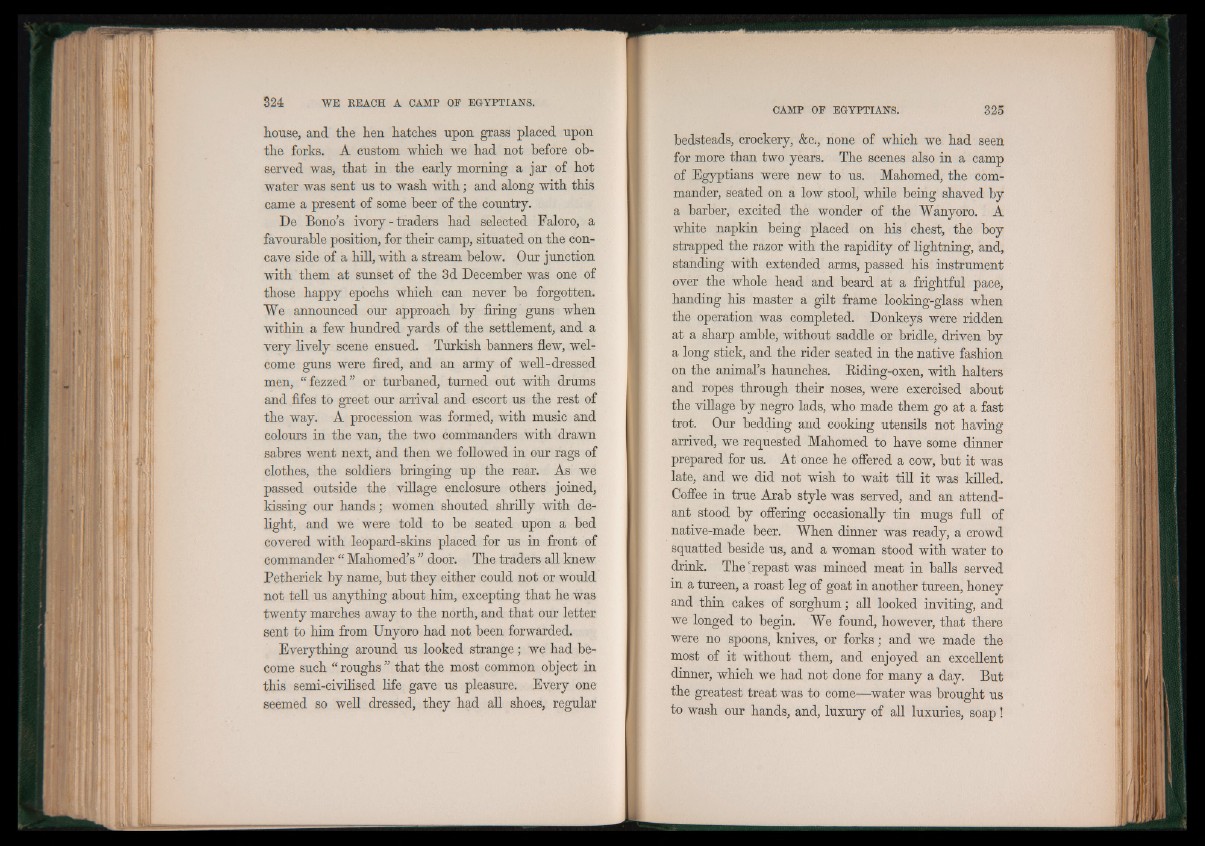
house, and the hen hatches upon grass placed upon
the forks. A custom which we had not before observed
was, that in the early morning a jar of hot
water was sent us to wash with; and along with this
came a present of some beer of the country.
De Bono’s ivory - traders had selected Faloro, a
favourable position, for their camp, situated on the concave
side of a hill, with a stream below. Our junction
with them at sunset of the 3d December was one of
those happy epochs which can never be forgotten.
We announced our approach by firing guns when
within a few hundred yards of the settlement, and a
very lively scene ensued. Turkish banners flew, welcome
guns were fired, and an army of well-dressed
men, “ fezzed ” or turbaned, turned out with drums
and fifes to greet our arrival and escort us the rest of
the way. A procession was formed, with music and
colours in the van, the two commanders with drawn
sabres went next, and then we followed in our rags of
clothes, the soldiers bringing up the rear. As we
passed outside the village enclosure others joined,
kissing our hands; women shouted shrilly with delight,
and we were told to be seated upon a bed
covered with leopard-skins placed for us in front of
commander “ Mahomed’s ” door. The traders all knew
Petherick by name, but they either could not or would
not tell us anything about him, excepting that he was
twenty marches away to the north, and that our letter
sent to him from Unyoro had not been forwarded.
Everything around us looked strange; we had become
such “ roughs” that the most common object in
this semi-civilised life gave us pleasure. Every one
seemed so well dressed, they had all shoes, regular
bedsteads, crockery, kc>, none of which we had seen
for more than two years. The scenes also in a camp
of Egyptians were new to us. Mahomed, the commander,
seated on a low stool, while being shaved by
a barber, excited the wonder of the Wanyoro. A
white napkin being placed on his chest, the boy
strapped the razor with the rapidity of lightning, and,
standing with extended arms, passed his instrument
over the whole head and beard at a frightful pace,
handing his master a gilt frame looking-glass when
the operation was completed. Donkeys were ridden
at a sharp amble, without saddle or bridle, driven by
a long stick, and the rider seated in the native fashion
on the animal’s haunches. Kiding-oxen, with halters
and ropes through their noses, were exercised about
the village by negro lads, who made them go at a fast
trot. Our bedding and cooking utensils not having
arrived, we requested Mahomed to have some dinner
prepared for us. At once he offered a cow, but it was
late, and we did not wish to wait till it was killed.
Coffee in true Arab style was served, and an attendant
stood by offering occasionally tin mugs full of
native-made beer. When dinner was ready, a crowd
squatted beside us, and a woman stood with water to
drink. The ‘ repast was minced meat in balls served
in a tureen, a roast leg of goat in another tureen, honey
and thin cakes of sorghum; all looked inviting, and
we longed to begin. We found, however, that there
were no spoons, knives, or forks; and we made the
most of it without them, and enjoyed an excellent
dinner, which we had not done for many a day. But
the greatest treat was to come—water was brought us
to wash our hands, and, luxury of all luxuries, soap !